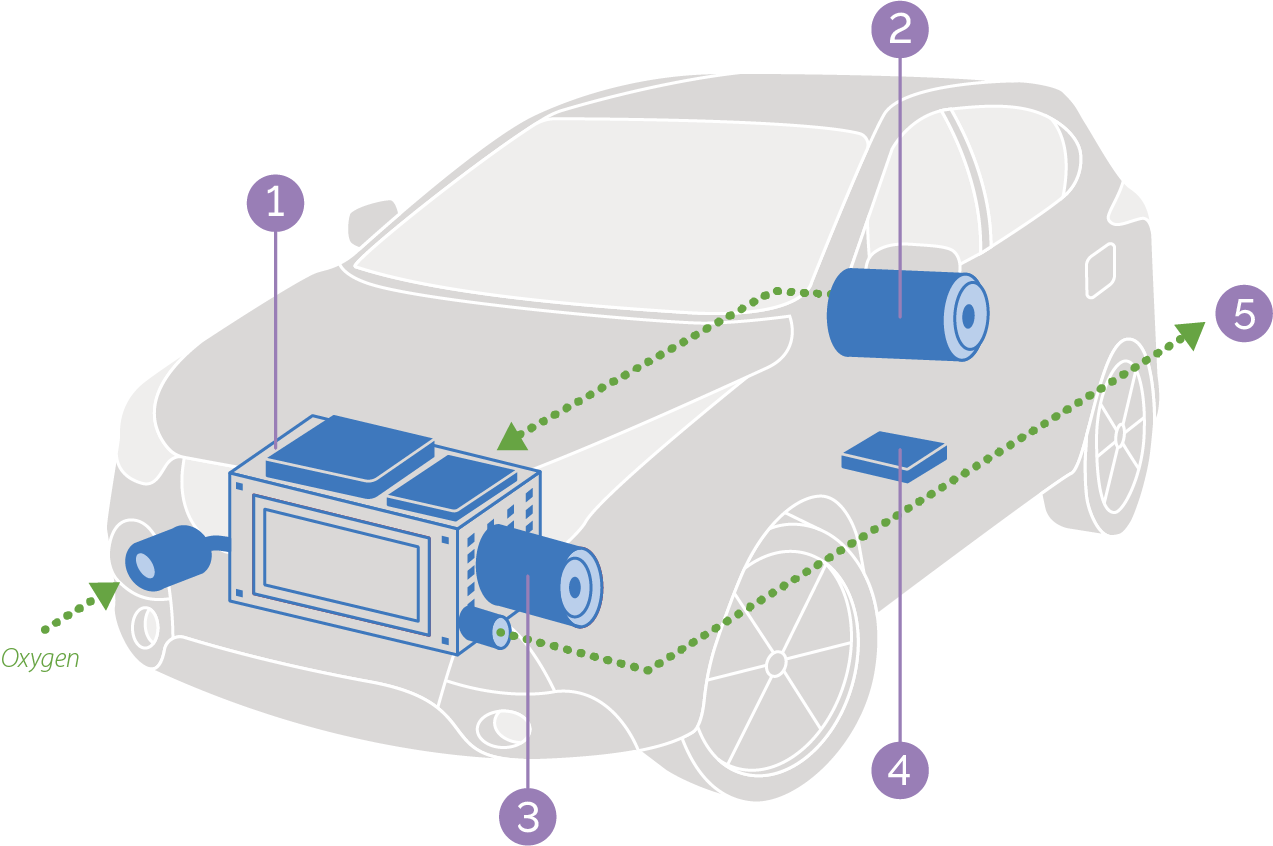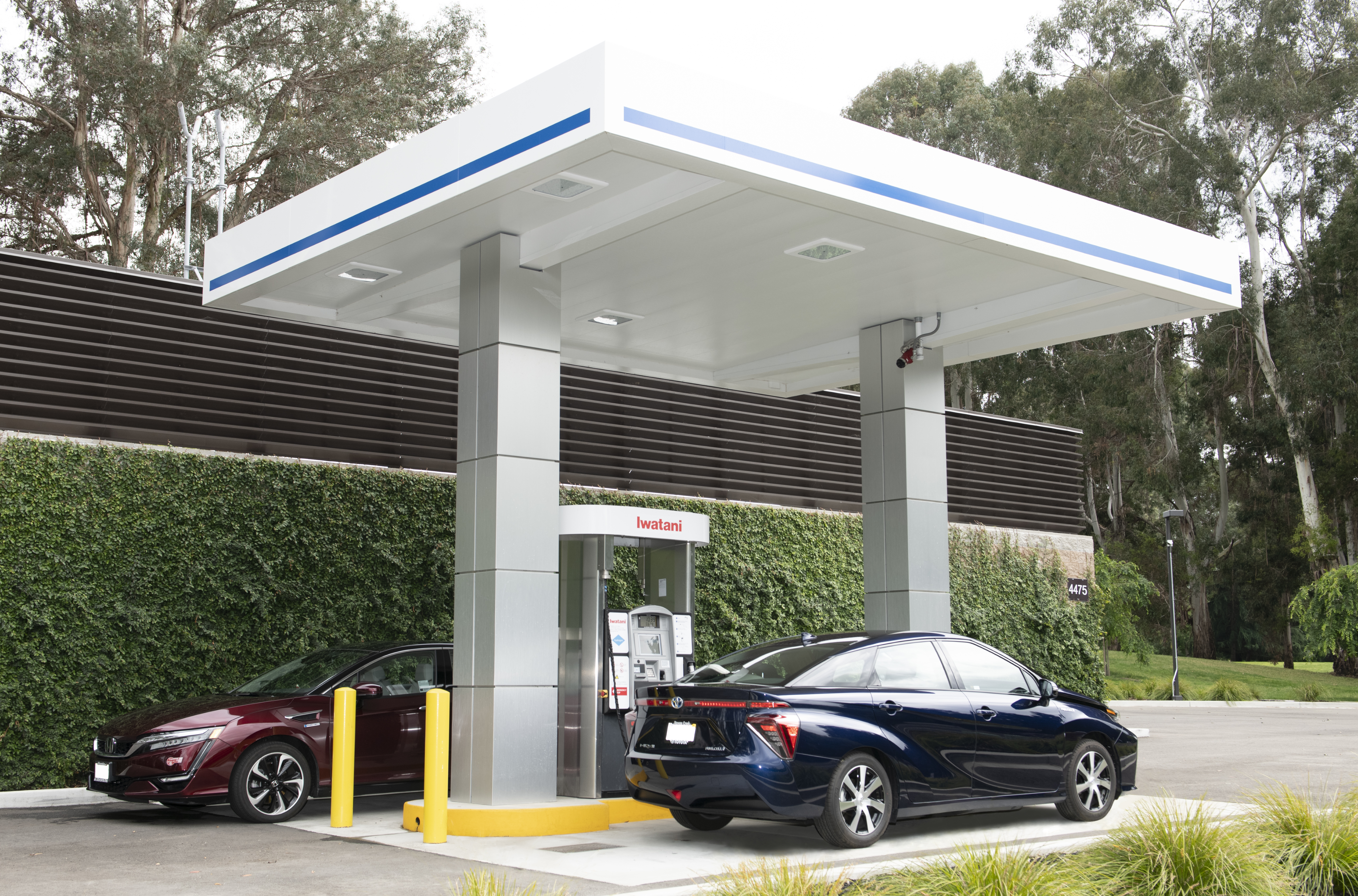Hydrogen Fuel Cell Electric Cars
Fuel cell electric cars are powered by the most abundant element in the universe: hydrogen. Although a fuel cell car runs on electricity, it does so differently than battery-powered or plug-in hybrid cars. In a fuel cell, hydrogen reacts electrochemically to produce electricity to power the car.
Benefits
- Fun to drive
- Instant torque and smooth, consistent power
- High-tech
- Low maintenance
- Zero emissions
- Fast refueling (3-5 minutes)
- High range
- Access to carpool lanes and other incentives
- Attractive lease pricing often bundled with free fuel/maintenance
How They Work
Fuel cell cars are powered by compressed hydrogen gas that feeds into an onboard fuel cell stack that doesn’t burn the gas, but instead transforms the fuel’s chemical energy into electrical energy. This electricity then powers the car’s electric motors. Tailpipe emissions are zero, and the only waste produced is pure water.
The construction of the fuel cell is similar to a battery. Hydrogen enters the anode, where it comes in contact with a catalyst that promotes the separation of hydrogen atoms into an electron and proton. The electrons are gathered by the conductive current collector, which is connected to the car’s high-voltage circuitry, feeding the onboard battery and/or the motors that turn the wheels.

- Fuel Cell Stack – An aggregate of numerous fuel cells that combine oxygen and hydrogen to generate electricity and power the electric motor
- Fuel Tank – Hydrogen gas is stored in carbon-fiber reinforced tanks to provide fuel to the fuel-cell stack
- Electric Motor – Powers the car using energy produced in the fuel cell stack
- Battery – Captures energy from regenerative braking and provides additional power to the electric motor
- Exhaust – The byproduct of the reaction occurring in the fuel cell stack is water vapor, which is emitted through the exhaust
Availability
Fuel cell cars are available for sale or lease by major automakers in popular vehicle types, including sedans and compact SUVs. As the numbers increase, stakeholders are working to ensure hydrogen is widely available to drivers. Search vehicles to see available models.
Performance
Hydrogen fuel cell cars are quiet, very energy efficient, produce no emissions and have equivalent range and performance to gasoline counterparts. Drivers identify range, refueling time, emissions, power and performance as valuable vehicle characteristics.
Costs
While a fuel cell car acquisition can cost more than comparable sized conventional cars, current leasing packages usually include fuel, service and maintenance to compensate. With these incentives included, total cost of ownership for a fuel cell car can be comparable to conventional cars.
Incentives
Fuel cell cars are eligible for a $4,500 rebate ($7,500 for income qualified purchasers) from California’s Clean Vehicle Rebate Project. They also qualify for the Clean Air Vehicle decal to drive solo in the carpool lanes, as well as various programs to support clean transportation ownership in low income and disadvantaged communities. Check for other incentives in your region.
Fueling

Fuel cell cars can carry enough hydrogen fuel for 300-400 miles of range and their tanks can be refilled as quickly as that of a standard car’s gas tank. Current lease deals often include up to three years of complimentary fuel. At the pump, hydrogen sells for considerably more than gasoline, however, a fuel cell car travels about twice as far as a conventional car on an equivalent amount of fuel.
Learn more about hydrogen fueling for fuel cell cars.
Additional Resources
California Hydrogen Initiatives
Get latest regulatory updates on hydrogen fueling infrastructure from the California Air Resources Board (CARB).
Hydrogen Fuel Cell Partnership (HFCP)
Industry/government collaboration aimed at expanding the market for fuel cell electric vehicles powered by hydrogen.
U.S. Department of Energy – Fuel Cell Vehicles
Federal government website providing overview of fuel cell technology and a comparison between available models.
California Hydrogen Business Council (CHBC)
Advocacy group comprised of over 100 companies and agencies working to advance the commercialization of hydrogen and fuel cell industry.
Electric For All Fuel Cell Cars
A comprehensive listing of fuel cell electric car models currently available in California, including incentives.
